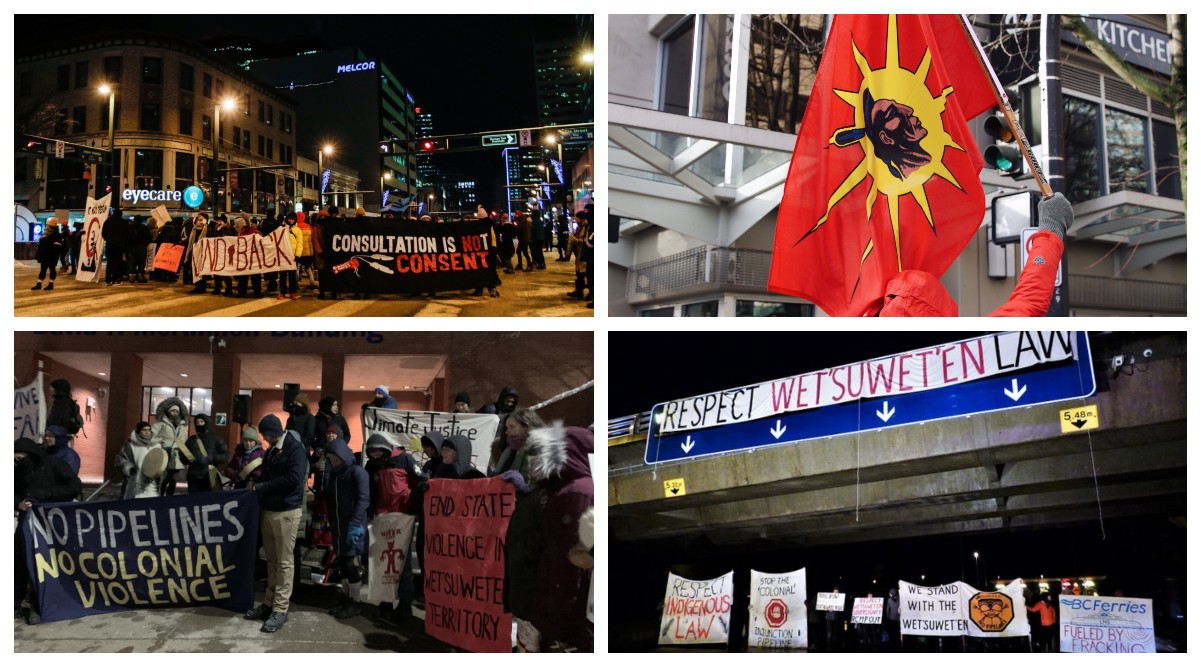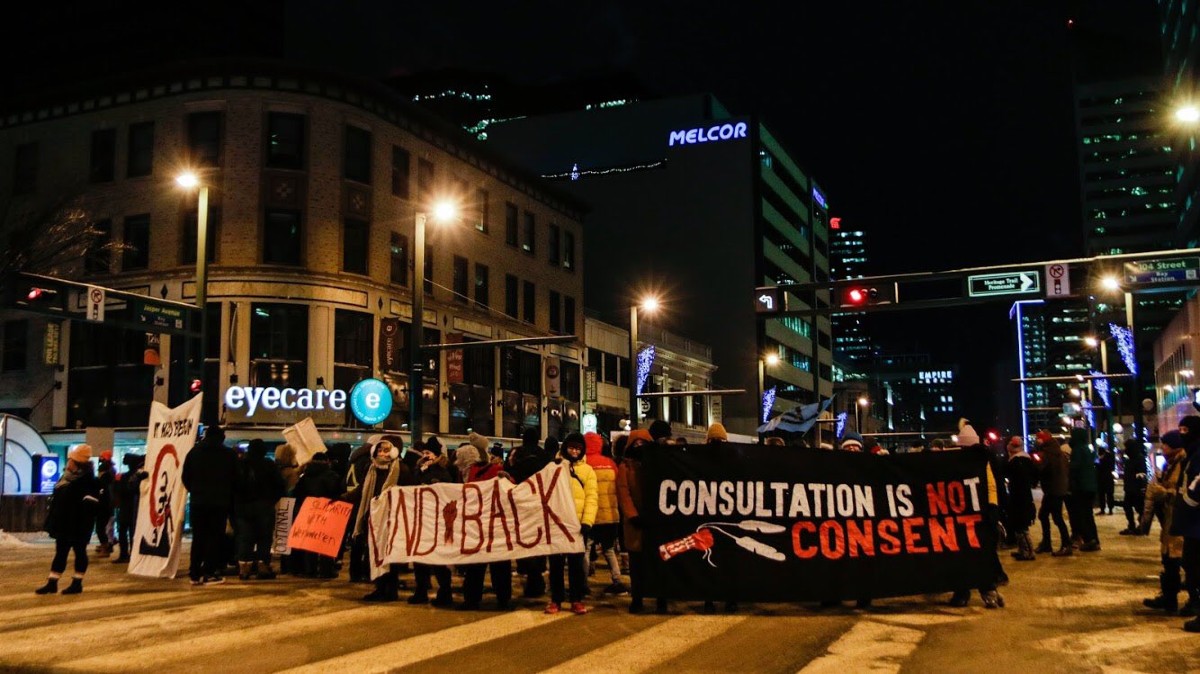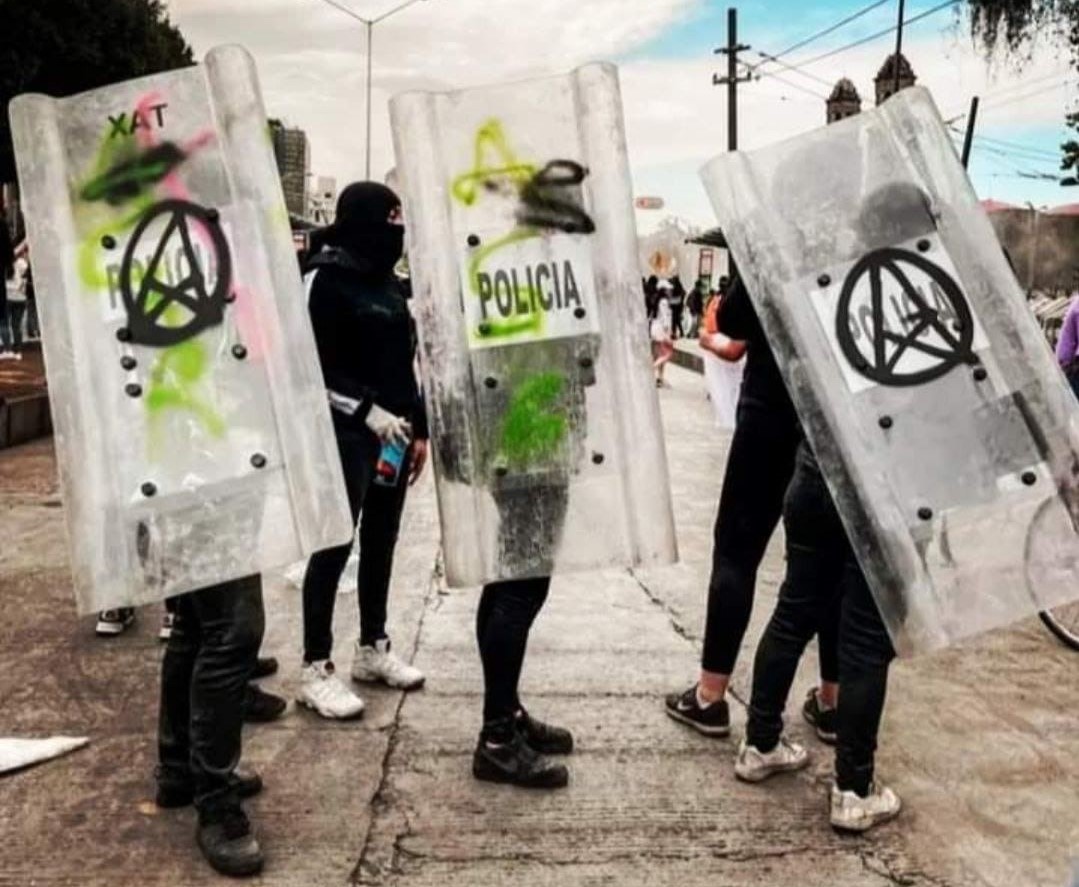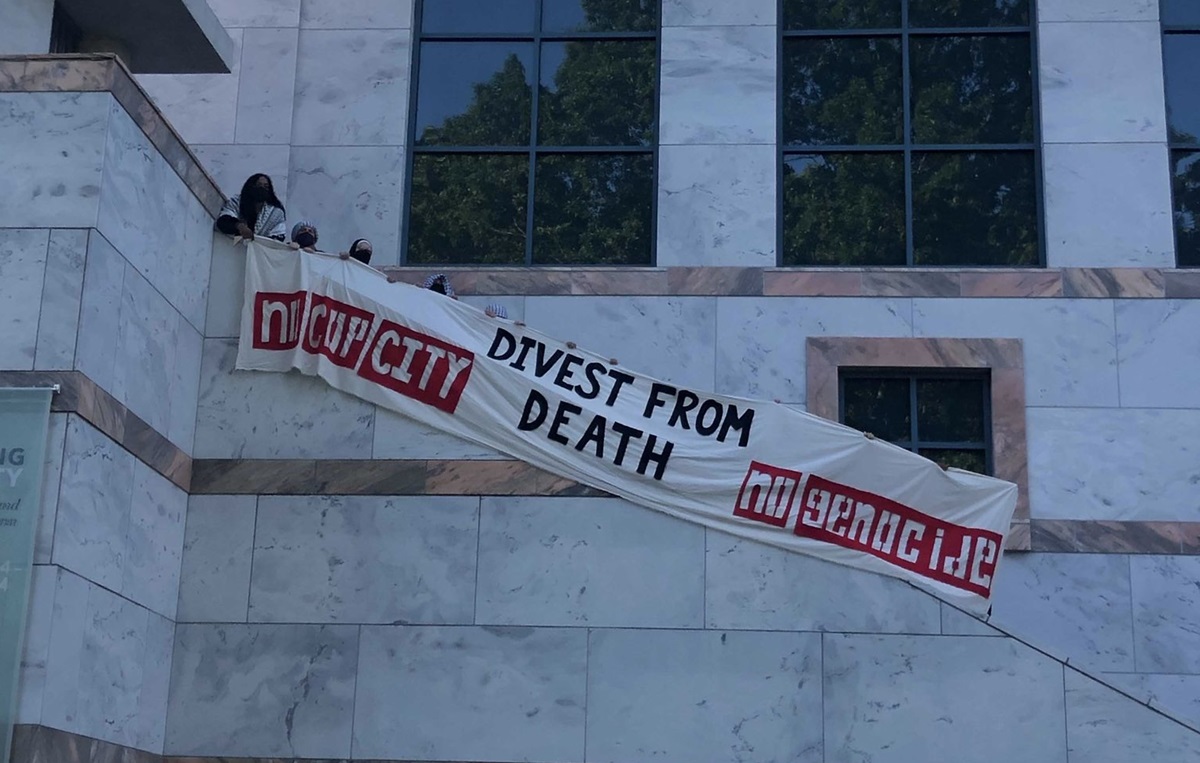Filed under: Action, Anarchist Movement, Canada, Indigenous, Solidarity

Since late December, the struggle on unceded Wet’suwet’en territory to evict and keep out the Coastal GasLink corporation and RCMP authorities, has intensified. In the face of continued police action and corporate incursion, supporters, anarchists, and the Wet’suwet’en themselves have issued calls for people to take the streets in solidarity and carry out actions starting on January 5th to raise the costs of a potential eviction.
Heeding the call, across dozens of cities in various counties, people organized mass marches, office occupations, student walk-outs, autonomous actions ranging from targeted vandalism to rail road sabotage, and full scale blockades of highways, ports, and roads.
As resistance has intensified, RCMP presence on Wet’suwet’en territory has also increased. As Global News wrote:
Now, with enforcement of a new injunction looming and RCMP setting up an “access control checkpoint” outside her camp, Wickham says she and the other opponents are struggling.
“I feel the same way we did last year,” she told Global News Friday. “That we’re backed into a corner.
“The threat of being criminalized, the threat of being imprisoned and removed from the territory, again … our ancestors didn’t fight hard just so that we would give up our entire future on our territory.”
An injunction was served to “to clear any blockades standing in the way of construction,” however a series of meetings are supposed to take place first with hereditary chiefs, although the Premier of British Columbia, John Horgan, has made it clear where the State stands. He stated recently that:
The CGL pipeline will get built even with opposition from Wet’suwet’en hereditary chiefs and protesters along the pipeline route. The premier says the communities must abide by a ruling from the B.C. Supreme Court giving CGL the right to complete the project.
Coastal GasLink, which is fighting to put through a massive LNG pipeline, has currently signed a agreement with 20 band councils along the 670-pipeline route, however hereditary chiefs point out that band councils do not speak for those on unceded territories. As indigenous anarchists such as Gord Hill have argued over the years, the band council system is notoriously corrupt and designed to help facilitate colonial interests.
As Hill stated in an interview:
The Assembly of First Nations (AFN) is comprised of all the band council chiefs. We refer to them as the “Indian Act chiefs” because the Indian Act is federal legislation that was introduced in 1876 and it was through this act that the Canadian government imposed the reservation system and the band council system and status, like who is a Native. That’s the main thing about the Indian Act, so since then they imposed these band councils and chiefs onto all the reserves. The Assembly of First Nations was established in the early 1980s and it’s a national organization of these Indian Act chiefs. They’re basically a lobby group with the government. They’re a political organization of the Indian Act chiefs.
The whole thing about the Indian Act chiefs and the band councils is that one of the reasons we don’t have a very strong indigenous grassroots movement here is because of the Indian Act chiefs. One of their roles is to control Native people. One of the things they do is that they’ve always worked to suppress grassroots movement here. It’s a big problem when you have a supposedly grassroots movement arising. These Indian Act chiefs are Aboriginal businessmen, for the most part. There’s a term we have up here called “Aboriginal business elite,” because these are people involved in multi-million dollar corporations through the band council system and Indian Act system.
Basically a defining characteristic of the grassroots [indigenous] movements that have existed in the last 30 years, that they’re outside of the band council system. A lot of times they’re in opposition to the band council system. This opposition is intensified because of the band councils’ collaboration with the police and the government against them, so it’s very common that most grassroots movements that are wise are opposed to the band council system. Autonomously, without the band councils, without the government funding. In Kanesatake [Quebec], which is [near] Oka, in 2005 the band council chief was bringing in police to repress the political opposition on the reserve, so the people gathered and they forced the police out of the reserve and they burned the chief’s house down. That’s a strong example, but it is an example that there’s a lot of animosity between grassroots people and the band councils. The band councils control everything on the reserve, the housing, education, social assistance care and if you’re a grassroots person that is on the reserve, you suffer as a result. You’re not going to get your housing, you’re not going to get money for education. They’re all these things that the band council controls and that’s by design. The government imposed the band councils and they’re supposed to be in control of all this infrastructure on the reserve and that’s one way they control the population.
With both resistance intensifying, the political State looking to end the standoff, and also the RCMP setting up checkpoints to restrict access onto the territory, there is a growing need for continued resistance. In that spirit, here’s our current roundup of solidarity actions since the call for support began. To view our previous roundup, go here.
Roundup of Actions
Olympia, WA: Rally and port disruption.
None there and no LNG in the 253. Only indegenous autonomy ok?
OK cool
@Redefine_Tacoma pic.twitter.com/k3Y1OAwPP5— Olympia Stand (@Olystand) January 15, 2020
Seattle, WA: Group disruptions shut down the Canadian embassy and Chase bank branches.
SEATTLE The Canadian consulate and 2 chase branches closed their offices today in order to avoid peaceful people protesting over the injunction and permitting of militarized police at #Wetsuweten all this for a fracked gas pipeline #CoastalGasLink pic.twitter.com/QxWVigcegw
— Mary Lovell (@MaryJLovell) January 10, 2020
Vancouver, BC: Rally organized in solidarity.
Spotted in Vancouver this morning. #WetsuwetenStrong pic.twitter.com/ppwce3FdOI
— Alexa Strabuk? (@alexastrabuk) January 20, 2020
some photos from today’s solidarity action standing with wet’suwet’en on unceded xʷməθkʷəy̓əm, sḵwx̱wú7mesh, and səl̓ilwətaɁɬ territory. #wetsuwetenstrong #protecttheyintah #landback #frackoff pic.twitter.com/cg1UexBOmp
— Tecla Van Bussel (@teclavanb) January 12, 2020
Prince George, BC: Rally organized in solidarity.
Rally in support of Wet'suwet'en hereditary chiefs opposing Coastal GasLink pipeline outside the Prince George courthouse today. Background: https://t.co/RAdo2Okxdc #CityOfPG pic.twitter.com/9VgZmDys2Q
— Andrew Kurjata ? (@akurjata) January 9, 2020
Kelonwna, BC: Supporters converge in the Downtown and shut down streets.
Wet’suwet’en Nation supporters swarm downtown Kelowna in protest of pipeline https://t.co/8sGARmHVQi #bcpoli
— BC Ecosocialists (@BCEcosocialists) January 13, 2020
Victoria, BC: Hundreds of University of Victoria students walk-out of class and take to the streets. Swartz Bay ferry terminal shut down in solidarity. Indigenous youth occupy the Office of the Ministry of Energy.
Massive highway and BC ferry terminal shut down in solidarity with #WetsuwetenStrong. https://t.co/4bOb2sD4I5
— It's Going Down (@IGD_News) January 21, 2020
SOLIDARITY with Wet'suwet'en as hundreds of University of Victoria students walk out of classes in pouring rain & linked up with Kolin Sutherland-Wilson striking all week at BC Legislature. Unceded land is under attack by #CoastalGasLink building fracked gas pipeline #Wetsuweten pic.twitter.com/QmwByTjd0R
— allan crawshaw (@allan_crawshaw) January 11, 2020
For immediate Release! 11AM, indigenous youth started a peaceful blockade of the Minister Of Energy, Mines and Petroleum Developments office.Cops are outside but youth will not leave until the demands of Wet’suwet’en hereditary chiefs have been met.They do this for their future. pic.twitter.com/kPHTJGf4ke
— Portland Rising Tide (@pdxrisingtide) January 21, 2020
Calgary, AB: Rally organized in solidarity.
Edmonton, AB: Night march takes to the Downtown and shuts down streets.
Via @vv_ronica
Ottawa, ON: Mass march organized in solidarity.
Solidarity with the protesters for Wetsuweten Nation today in Ottawa #WetsuwetenStrong #cdnpoli pic.twitter.com/NAiLqosj2J
— Hi-Fi Pizza ??? (@hifipizza) January 10, 2020
Hamilton, ON: Rolling street march disrupts Downtown.
Seems like #RollingBlockades is the tactic of the yearhttps://t.co/MwBuxpLj2e#WetsuwetenStrong
— Franklin López (@Franklin__Lopez) January 17, 2020
Toronto, ON: Mass marches shut down streets. Rail road sabotage shuts down train tracks. Office occupation of Deputy Prime Minister.
We’ve now taken over King and Bay! pic.twitter.com/w8Mwl6lZaQ
— Climate Justice Toronto (@CJusticeTO) January 7, 2020
BREAKING: 19 youth from CJTO have occupied the office of Deputy PM @cafreeland. We’re demanding immediate federal action in support of Wet’suwet’en land defenders who are resisting a state-sanctioned colonial invasion intended to push the CGL pipeline through unceded land. pic.twitter.com/4x7Cu7NWP0
— Climate Justice Toronto (@CJusticeTO) January 20, 2020
Guelph, ON: Some of the busiest intersections in Downtown Guelph are ground to a halt by a solidarity demonstration.
Rally in solidarity with Wet'suwet'en chiefs temporarily closes Guelph intersection Sunday afternoon.
The intersection has since reopened.https://t.co/XK2hgNLsKO pic.twitter.com/6tsyuUxrGl— GuelphMercuryTribune (@MercuryTribune) January 12, 2020
Kingston, ON: March on and disruption of the Queen’s Global Energy Conference. Informational street blockade also organized.
On Friday, January 17th a group of approximately 15 people took control of a busy commuter street on both sides of a ground-level rail crossing for the CN main line in Kingston, Ontario. We used banners and our bodies to stop traffic and flyered the waiting cars with information about the ongoing struggle on Wet’suwet’en territory.
Ultimately, the action still felt largely positive. We held onto an arterial road for more than our intended 20 minutes (a conservative window based also on the assumption that we’d be dealing with the police response to a rail blockade). Many of the drivers were surprisingly supportive despite being held up substantially during the Friday afternoon commute. Of course, some of them were instead angry. People even had a few conversations through open car windows and answered questions about why we were there. The police response came after our departure. Several people came out who I haven’t seen at similar actions in the past, and I suspect it was a new kind of risk for more than one of them. I hope that it felt empowering and that it will embolden us for future collective actions.
Southern Ontario: Railroad sabotage in solidarity with Wet’suwet’en.
A few nights ago, an anarchist settler sabotaged CN’s main transcontinental rail line. If TC Energy wanted to transport anything from southern Ontario or further east to CGL sites in BC, it’s likely that this they’d use this line.
And especially as settlers, we should continue finding opportunities to disrupt this project. CGL continues to threaten destruction of Wet’suwet’en lands and their way of life.
Solidarity with Wet’suwet’en! We’ll continue showing the violent colonial state and CGL that we won’t back down. It’s so easy to block the infrastructure that enables exploitative projects like CGL.
Kahnawake, Mohawk Territory: Rolling blockade organized which drastically slowed traffic on freeway.
Posted by Chelsea Brosseau on Thursday, January 16, 2020
Montreal, QC: Racist statue vandalized against RCMP repression. Flaming barricades erected in solidarity. Report back from the action read:
This morning around 7:30am, about sixty people enraged by the invasion of Wet’suwet’en land by Coastal GasLink and the RCMP gathered in the east of Montreal. They blocked the intersection of Pie-IX Boulevard and Notre-Dame Street East in the middle of rush hour, in order to disrupt access to the Port of Montreal as well as downtown via Autoroute 720.
Banners were deployed reading “GTFO of Wet’suwet’en land” and “Solidarity with Indigenous Sovereignties”, and flyers explained the reasons for the action to motorists.
Leaving flaming barricades, the group marched westward on Notre-Dame, forming a roving blockade and building more barricades on its way.
Flaming barricades in solidarity with #Wetsuweten this AM in #Montreal https://t.co/7mUZo6EPxA pic.twitter.com/p0qMnrA9TW
— Franklin López (@Franklin__Lopez) January 16, 2020
Racist Macdonald Monument in Montreal vandalized with paint, in solidarity with anti-pipeline Wet’suwet’en & Secwepemc Indigenous Land Defenders, in opposition to Trudeau and state repression. INFO: https://t.co/5FRBol7DLk #cdnpoli #Wetsuweten #bcpoli #MacdonaldMustFall #polmtl pic.twitter.com/pkPHHn3BiY
— No Borders Media (@NoBordersMedia) January 16, 2020
Halifax, NS: Over 100 rally in solidarity with Wet’suwet’en outside of police station. Connections are made to local Mi’kma’ki struggle.






